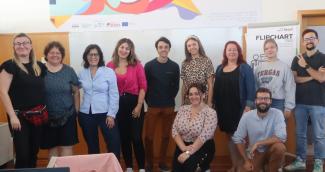SDG 4 Youth project

Cooperation Partnership in Youth, Key Action 2 / Sustainable Development Goals for Youth – SDG 4 Youth
This action, under the Erasmus+ program, allows organizations to strengthen their capacities and thereby enhance the quality of their activities – through the exchange of good practices and the development of innovative tools – stimulated by the internationalization of their activities. The proposed activities can be carried out in the fields of education, training, youth, sports, or other socio-economic sectors.
The SDG 4 Youth project, coordinated by the Centro de Juventude de Agueda, brings together five partners from different countries: Portugal, Croatia, Estonia, Greece, and France. The main objective of this project is to encourage youth participation in the sustainable development principles set by the United Nations.
Over 20 months, partners from Portugal, France, Estonia, Croatia, and Greece will gather and launch workshops with young participants with the aim of creating a guide of best practices to facilitate youth participation in sustainable development goals. Ten participatory workshops have been co-created by the partners, and they are being tested in each country of the consortium. The implementation of these workshops allows for exchanges with young people to understand their level of involvement and knowledge on this topic. Online workshops have also been developed to enable young people from each country to exchange ideas.
A week of workshops on sustainable development bringing together 30 young people from 5 different countries
From April 7 to April 13, 2024, six young people from each organization were gathered in Agueda, Portugal, for a week of workshops on sustainable development.
During this week, various themes were addressed such as "fast fashion", eco-anxiety, and waste management. These workshops were conducted using non-formal education methods, and participants were proactive in both facilitating and developing content.
This was a great opportunity for participants to meet and exchange with young people from different countries, but also to discover non-formal education and the Erasmus+ program from a different perspective.


